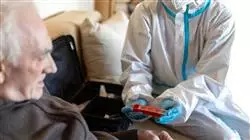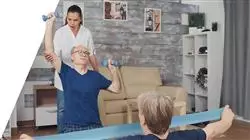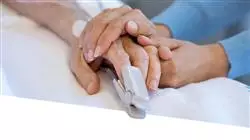University certificate
The world's largest faculty of physiotherapy”
Why study at TECH?
A Hybrid professional master’s degree that will allow you to manage complex physiotherapy situations in the home environment with our highly specialized program”

Home Hospitalization is a healthcare model that has become increasingly relevant today due to technological advances and the need to provide more personalized and effective care to patients. This model focuses on providing medical and rehabilitation care in the patient's home, avoiding hospitalization in a medical center.
In this context, physiotherapy plays a fundamental role in Home Hospitalization, since professionals in this area are in charge of evaluating and treating the patient's physical limitations, avoiding hospitalization in a medical center and treat the patients' physical limitations, thus improving their quality of life. That is why this Hybrid professional master’s degree in Home Hospitalization of TECH is an essential program for physical therapy professionals who wish to update their knowledge in this field.
Therefore, this university qualification focuses on providing students with the necessary tools to perform in Home Hospitalization in an effective and efficient manner, with a focus on personalized patient care. In addition, the innovative didactic material available 24 hours a day from any digital device allows students to adapt their study schedule to their needs.
In addition, the culmination of this academic experience comes in its final stretch, where the graduate will have the opportunity to perform an internship of 3 weeks in a clinical center specialized in this field. A period, where they will be surrounded by the best experts and will be able to integrate both the concepts dealt with in the theoretical framework, as well as the procedures used by real specialists.
Undoubtedly, an ideal opportunity for a complete update, through an unparalleled, flexible academic option that meets the real needs of updating physiotherapists.
Make the most of this opportunity to surround yourself with expert professionals and learn from their work methodology"
This Hybrid professional master’s degree in Home Hospitalization contains the most complete and up-to-date scientific program on the market. The most important features include:
- Development of more than 100 cases presented by physiotherapy professionals who are experts in the approach to patients in their homes
- The graphic, schematic, and practical contents with which they are created, provide scientific and practical information on the disciplines that are essential for professional practice
- Patient assessment and integration of the latest recommendations to successfully integrate therapeutic procedures
- Comprehensive systematized action plans for the main pathologies
- Presentation of practical workshops on diagnostic techniques
- An algorithm-based interactive learning system for decision-making in the clinical situations presented throughout the course
- Approach to the different injuries according to the specific characteristics of the population
- With a special emphasis on evidence-based medicine and research methodologies in recovery of patients
- All of this will be complemented by theoretical lessons, questions to the expert, debate forums on controversial topics, and individual reflection assignments
- Content that is accessible from any fixed or portable device with an Internet connection
- Furthermore, you will be able to carry out a clinical internship in one of the best clinical and centers
Improve your skills as a physiotherapist in Home Hospitalization with our Hybrid professional master’s degree”
In this proposal for a Professional Master's Degree, of a professionalizing nature and hybrid learning modality, the program is aimed at updating psychology professionals who perform their functions in centers Clinical centers and hospitals, and who require a high level of qualification. The contents are based on the latest scientific evidence, and oriented in an educational way to integrate theoretical knowledge into practice, and the theoretical-practical elements will facilitate knowledge update and decision-making in patient management.
Thanks to the multimedia content, developed with the latest educational technology, FISIOTERAPIA professionals will benefit from situated and contextual learning, i.e., a simulated environment that will provide immersive learning programmed to train in real situations. This program is designed around Problem-Based Learning, whereby the physician must try to solve the different professional practice situations that arise during the course. For this purpose, students will be assisted by an innovative interactive video system created by renowned and experienced experts.
Get a comprehensive view of home care and delve into the specific needs of each patient with this university program"

Develop communication and empathy skills to enhance your relationship with patients and their families in home care"
Teaching Planning
The Hybrid professional master’s degree in Home Hospitalization offers a comprehensive and high quality program that combines both theory and practice in a balanced way. Physiotherapists will have access to the best specialists in the field of Respiratory Physiotherapy, allowing them to improve their advanced skills and learn innovative treatment techniques. In addition, the internship in a recognized clinical center will provide them with an unbeatable experience to apply the concepts addressed in a real environment and under supervision. In addition, this program features innovative multimedia content and is available 24 hours a day, allowing access from any digital device with an internet connection.

You have a Virtual Library, accessible 24 hours a day, from any digital device with internet connection”
Module 1. Organization of Home Hospitalization
1.1. Introduction and Justification
1.1.1. Introduction
1.1.2. Justification
1.2. History of Home Hospitalization
1.2.1. Historical Recap
1.2.2. Reference Units
1.2.3. The Present and Future of Home Hospitalization
1.3. Organizational Models
1.3.1. Hospital-Based Home Care
1.3.2. Care Based on Primary Care
1.3.3. Support Service at Home
1.4. Differences Between HH and Home Care from Primary Care and Other Models of Home Care (HDOM)
1.4.1. HH
1.4.2. Home Care Models
1.5. Evidence-Based Medicine
1.5.1. Advantages and Disadvantages of the HaD Model in Relation to Conventional Hospitalization
1.6. Portfolio of services
1.6.1. Early Discharge Scheme
1.6.2. High-Tech Scheme
1.6.3. Support Function Scheme
1.7. General Criteria for Inclusion and Exclusion
1.7.1. Wilfulness
1.7.2. Social criteria
1.7.3. Geographical Criteria
1.7.4. Medical Criteria
1.8. Integration with Different Care Levels
1.8.1. Primary Care
1.8.2. Emergencies
1.8.3. Conventional Hospitalization
1.8.4. Social-Health Centers
1.8.5. Residences
1.9. Structure and Resources of HH
1.9.1. Structure of HH
1.9.2. Resources in HH
Module 2. General Aspects. Research and Teaching
2.1. Process Management
2.1.1. Pre-Admission Assessment
2.1.2. Admission
2.1.3. Discharge and Transfer to Primary Care
2.1.4. Re-admission
2.1.5. Case Management
2.2. Electronic Medical History, Peculiarities of HH (mobility and accessability)
2.2.1. Telemedicine
2.3. Quality Indicators
2.3.1. Management Indicators
2.3.2. Clincial Indicators
2.4. Research in HH
2.4.1. Future and Present Lines of Work in the HaD
2.5. Undergraduate and Postgraduate Teaching
2.5.1. Undergraduate Teaching
2.5.2. Postgraduate Teaching
2.6. Future Perspectives
2.6.1. Future Challenges
2.7. Telemedicine
2.7.1. Concept and Considerations
2.8. Case Management
2.8.1. Nursing Management of Hospital Cases
2.8.2. Nursing Management of Community Cases
2.8.3. Management of Medicine-Based Cases
Module 3. Care for Different Specific Types of Patients
3.1. Fragile Geriatric Patient
3.1.1. Peculiarities in a Geriatric Patient
3.1.2. Relationship Model with Assisted Care Residences
3.1.3. Treatment of Geriatris Patients
3.2. Complex Chronic Patient
3.2.1. Definition
3.2.2. Management Models for Complex Chronic Patients
3.2.3. Terminal Criteria
3.3. Palliative Patient
3.3.1. Differences Between an Oncologic or Non-Oncologic Palliative Patient
3.3.2. Terminal Criteria
3.3.3. Management Models for Palliative Patients
3.4. Polyfrequency Patients
3.4.1. Case Management
3.5. Home-Based Antibiotic Therapy
3.5.1. General Aspects
3.5.2. Home Intravenous Antibiotic Therapy
3.6. Psychiatric Patient
3.6.1. Peculiarities of Home-Based Mental Health Monitoring
3.7. Pediatric Patient
3.7.1. Considerations in a Pediatric Patient
Module 4. Management of Subsidiary Syndromes at Home
4.1. Heart Failure
4.1.1. Criteria for Admission and Exclusion
4.1.2. Management of Treatment and Symptoms in the Home
4.1.3. Criteria for Discharge
4.2. COPD
4.2.1. Criteria for Admission and Exclusion
4.2.2. Management of Treatment and Symptoms in the Home
4.3. Caring for a Patient Post-Surgery
4.3.1. Criteria for Admission and Exclusion
4.3.2. Management of the Main Symptom and Complications in Patients Post-Surgery
4.4. Neurological Patient
4.4.1. Dementia
4.4.2. Multiple Sclerosis
4.4.3. ALS
4.5. DVT and PE
4.5.1. Home-Based Diagnosis
4.5.2. Treatment Adjusted to the Home
4.5.3. Admission Criteria in Conventional Hospitalization
4.6. Home-Based Rehabilitation Loss of Functionality Fractures
4.6.1. Scales of Functionality
4.6.2. Possibilities for Home-Based Rehabilitation
4.7. Nephrourological Syndromes
4.7.1. Pyelonephritis
4.7.2. Urinary Tract Infections
4.7.3. Prostate Disease
4.7.4. Acute and Chronic Kidney Disease
4.8. Patient with Digestive Diseases
4.8.1. Cirrhosis
4.8.2. Hepatic Encephalopathy
4.8.3. Small Intestine
Module 5. Management of Infections at Home Criteria for Admission and Exclusion, Management, Discharge Criteria
5.1. Pneumonia
5.1.1. Diagnosis
5.1.2. Home-Based Management
5.1.3. Bronchoaspirations Prevention and Management
5.2. Infections of the Urinary Tract
5.2.1. Pyelonephritis
5.2.2. Urinary Tract Infections
5.2.3. Prostatitis
5.3. Intra-Abdominal Infections
5.3.1. Liver Abscesses
5.3.2. Post-Surgery Abscesses
5.3.3. Cholecystitis and Cholangitis
5.3.4. Diverticulitis
5.3.5. Infectious Pancreatitis
5.4. Abscesses
5.4.1. General Aspects
5.4.2. Treatment
5.4.3. Types of Cure
5.5. Soft Tissue Infections
5.5.1. Concept
5.5.2. Classification
5.6. Infection of Surgical Wounds
5.6.1. Concept
5.6.2. Classification
5.7. Osteomyelitis
5.7.1. Concept
5.7.2. Classification
5.8. Endocarditis
5.8.1. Concept
5.8.2. Classification
5.9. Prosthesis and Intra-Vascular Device Infections
5.9.1. Concept
5.9.2. Classification
5.10. Febrile Neutropenia
5.10.1. Diagnosis
5.10.2. Treatment
Module 6. Palliative Care in Oncological Patients
6.1. Comprehensive Assessment in Palliative Care
6.1.1. Medical History Model in Palliative Care
6.1.2. Anamnesis in Palliative Care
6.1.3. The Importance of Family and Social Circumstances in a Comprehensive Assessment
6.2. Assessment Scales in Palliative Care
6.2.1. ECOG
6.2.2. Barthel
6.2.3. Karnofsky
6.2.4. VAS
6.2.5. Edmonton Symptom Assessment Scale
6.2.6. Gijón Scale
6.2.7. Family Apgar
6.2.8. Pfeiffer
6.2.9. Nutritional Assessment
6.3. Continuous Care Models in Palliative Oncology Patients
6.3.1. Palliative Patients
6.3.2. Models
6.4. Pain Management in Palliative Care
6.4.1. Analgesic Ladder
6.4.2. First Step
6.4.3. Second Step
6.4.4. Third Step
6.4.5. Coadjuvants
6.5. Control of Dyspnea
6.5.1. Diagnosis
6.5.2. Etiology
6.5.3. Home-Based Management
6.6. Delirium Control
6.6.1. Diagnosis
6.6.2. Etiology
6.6.3. Home-Based Management
6.7. Nausea and Vomiting Control
6.7.1. Diagnosis
6.7.2. Etiology
6.7.3. Home-Based Management
6.8. Alterations in Intestinal Rhythm Diarrhea and Constipation
6.8.1. Diagnosis
6.8.2. Etiology
6.8.3. Home-Based Management
6.9. Anorexia-Cachexia
6.9.1. Diagnosis
6.9.2. Etiology
6.9.3. Home-Based Management
6.10. Anxiety-Insomnia
6.10.1. Diagnosis
6.10.2. Etiology
6.10.3. Home-Based Management
6.11. Situation in a Patient's Last Days and Palliative Sedation
6.11.1. Terminal Criteria
6.11.2. Palliative Sedation vs. Passive Euthanasia vs. Active Euthanasia
6.11.3. Home-Based Management
6.12. Grief and Family Care
6.12.1. Grief
6.12.2. Family Circle
6.13. Spanish and European Legality on Palliative Care
6.13.1. Legal Aspects of Palliative Care in Europe
6.13.2. Legal Aspects of Palliative Care in Spain
6.14. Anticipated Wishes
6.14.1. Definition
6.14.2. Most Important Asepcts to Take Into Account
Module 7. Pain Management in Home Hospitalization
7.1. Pain Management
7.1.1. General Aspects
7.1.2. Considerations in the Home
7.2. Scales and Assessment of Patient in Pain
7.2.1. Classification
7.2.2. Patient Assessment
7.3. First-Line Analgesic Treatment
7.3.1. Treatment
7.3.2. Procedures in the Home
7.4. 2nd Line Analgesic Treatment
7.4.1. Treatment
7.4.2. Procedures in the Home
7.5. Third Step Treatment Opioids
7.5.1. Treatment
7.5.2. Procedures in the Home
7.6. Coadjuvants
7.6.1. Classification
7.6.2. Procedures
7.7. Interventional Pain Management
7.7.1. Interconsultation
7.7.2. Procedures in the Home
7.8. Current Legality in the Management of Opioid Analgesics
7.8.1. Current Spanish Legal Framework
Module 8. Nutrition in Home Hospitalization
8.1. Nutritional Assessment Scales
8.1.1. MUST
8.1.2. MNA
8.1.3. Laboratory Parameters
8.1.4. Clinical Parameters
8.2. Dysphagia
8.2.1. Diagnosis
8.2.2. Etiology
8.2.3. Home-Based Management
8.3. Oncology Patients
8.3.1. Nutritional Needs in Oncology Patients
8.3.2. Peculiarities
8.4. Geriatric Patient
8.4.1. Nutritional Needs in Geriatric Patients
8.4.2. Peculiarities
8.5. Patient with Infectious Diseases
8.5.1. Nutritional Needs in Infectious Patients
8.5.2. Peculiarities
8.6. Enteral Nutrition at Home
8.6.1. Types of Nutrition
8.6.2. Normocaloric- Normoprotein
8.6.3. Hyperproteic-Hypercaloric
8.6.4. Hyperproteic-Normocaloric
8.6.5. Special Supplementation
8.7. Parenteral Home Nutrition
8.7.1. Types of Nutrition
8.7.2. Probes
Module 9. Special Treatments
9.1. Serotherapy and EV Medication
9.1.1. Peripheral Routes
9.1.2. Central Routes
9.1.3. Drug Combinations
9.2. Administration of Blood Products
9.2.1. Red blood Cell Concentrates
9.2.2. Platelet Pool
9.2.3. Plasma
9.2.4. Protocols for Transfusion of Blood Derivatives at Home
9.3. Subcutaneous Medication
9.3.1. Elastomeric Infusers
9.3.2. Treatment with the Possibility of Subcutaneous Administration
9.3.3. Drug Combinations
9.4. Chemotherapy at Home
9.4.1. Classification
9.4.2. Considerations
9.5. Intravenous Treatment on Home Perfusion Pump
9.5.1. Classification
9.5.2. Considerations
9.6. Bladder and Digestive Probes
9.6.1. Home Replacement Protocols
9.6.2. Technical Videos
9.7. PEG Replacement
9.7.1. Home Replacement Protocols
9.7.2. Technical Videos
9.8. Tracheostomy Replacement
9.8.1. Home Replacement Protocols
9.8.2. Technical Videos
9.9. Obtaining and Transporting Samples: Analytical, Cultures, etc
Module 10. Pediatric Patient in Home Hospitalization
10.1. Introduction
10.1.1. Pediatric Patient Particularities
10.2. Specific Pediatric Assessment at Home
10.2.1. Considerations
10.3. Pediatric Oncology
10.4. Infections in Pediatrics
10.4.1. Classification
10.4.2. Procedures
10.5. Congenital Diseases
10.5.1. Classification
10.5.2. Considerations
10.6. Legality in Pediatric Patient Care
10.6.1. Spanish Legal Framework
10.6.2. Considerations
Module 11. Preventative Medicine in Home Hospitalization
11.1. Preventative Medicine
11.1.1. Concepts and Overviews
11.2. Hygiene
11.2.1. Considerations
11.2.2. Procedures in the Home
11.3. Colonization in Infection by Multiresistant Germs Home Measurements
11.3.1. Colonization
11.3.2. Multiresistant Germs
11.3.3. Home Measurements
11.4. Adequacy of Antibiotic Treatment at Home
11.4.1. Types of Treatment
11.4.2. Therapeutic Suitability
11.5. Vaccination in Special Patients
11.5.1. Vaccines
11.5.2. Special Patients
Module 12. Therapeutic Techniques
12.1. Paracentesis
12.1.1. Procedure
12.1.2. Home Paracentesis
12.2. Thoracentesis
12.2.1. Procedure
12.2.2. Home Thoracentesis
12.3. Arthrocentesis
12.3.1. Procedure
12.3.2. Home Arthrocentesis
12.4. Oxygen Therapy
12.4.1. Procedure
12.4.2. Home Oxygen Therapy
12.5. Aerosol Therapy
12.5.1. Procedure
12.5.2. Home Aerosol Therapy
12.6. Mechanical Ventilation
12.6.1. Procedure
12.6.2. Home Mechanical Ventilation
Module 13. Diagnostic Techniques
13.1. ECG
13.1.1. Procedure
13.1.2. ECG at Home
13.2. Ultrasound
13.2.1. Procedure
13.2.2. Ultrasound at Home
13.3. Pusioximetry
13.3.1. Procedure
13.3.2. Pusioximetry at Home
13.4. Analysis
13.4.1. Procedure
13.4.2. Blood Analysis at Home
13.5. Cultures
13.5.1. Procedure
13.5.2. Blood Analysis at Home
13.6. Scales (Functional, Cognitive, Nutritional Assessment, etc.)
13.6.1. Procedure
13.6.2. Classification

A university qualification that will lead you to delve into new ways of applying Physiotherapy in the home environment to improve the quality of life of patients”
Hybrid Professional Master's Degree in Home Hospitalization
The area of home physiotherapy has gained relevance in recent years in response to the need to provide comprehensive care services in the patient's home. TECH Global University has created the Hybrid Professional Master's Degree in Home Hospitalization for Physiotherapists, with the objective of offering updated knowledge in this area. During the program, topics related to the evaluation, diagnosis and treatment of pathologies of the musculoskeletal and neurological system, as well as post-surgical rehabilitation, respiratory therapy and care of patients in palliative care will be covered.
The program will cover topics related to the evaluation, diagnosis and treatment of pathologies of the musculoskeletal and neurological system, as well as post-surgical rehabilitation, respiratory therapy and care of patients in palliative care.
The Hybrid Professional Master's Degree in Home Hospitalization for Physical Therapists will promote the use of innovative technology and specialized tools for clinical practice in the patient's home. Participants will gain the theoretical and practical knowledge necessary to provide comprehensive care, including skills in case management and communication with patients and their families. This program is aimed at physical therapists who seek to specialize in home care and who wish to acquire skills for adequate performance and improvement of the quality of life of patients and their families. The Hybrid Professional Master's Degree in Home Hospitalization for Physical Therapists is an excellent option for those professionals looking for a quality update in a field of high labor demand.







